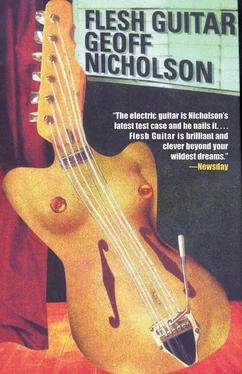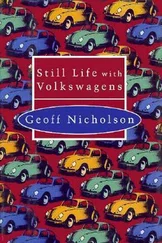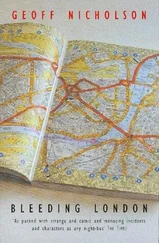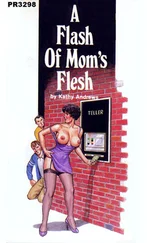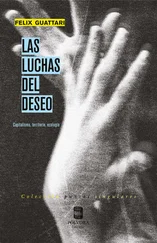‘Yeah, well I’d have nerves too if I was going to stand up on my own in front of a roomful of druggies, murderers and bum bandits.’
The two guards who’d taken Scorn’s equipment now arrived and set down the four electronic keyboards and amplifiers that he was using for his set. There was also a small, square card table, whose function at this stage was obscure. Scorn set up the gear himself, while the guards watched him with bored curiosity. Ostensibly they were here to help, to provide what he needed, but when he asked for a cup of coffee or a bottle of mineral water all three assured him these were unrealistic and unrealizable requests. Scorn got the impression that the guards were there as his captors rather than his protectors.
Soon sounds came from the corridor outside and the captive audience began to arrive. They shuffled into the theatre and took their places in the wooden seats. They seemed reluctant, repressed, as though they had been dragged there unwillingly, as though attendance at this concert was just another aspect of their continuing punishment. Certainly, Scorn noted with some relief, there appeared to be enough guards in attendance to ensure the prisoners behaved themselves.
He was used to facing an audience, but this time half of them were behind him, and he could feel their hostile stares boring into his back. He was also accustomed to waiting for an audience to settle down and quieten before he started playing but this audience was already absolutely silent and still.
The piece he had decided to play was called ‘Absent Kings’, one of his more recent, and in his opinion, less demanding compositions. The performance began as he produced a pack of playing cards, removed the four kings and tossed them into the audience. This caused the most muted of ripples. He then dealt out the rest of the pack face-down on the card table. He paused theatrically, then turned over the first card, looked at it briefly and ran to one of the keyboards where he played a single note of D.
The composition fell broadly into the category of ‘systems music’ and someone familiar with the genre might instantly have realized what Scorn was up to. Each card on the table represented a note of the chromatic scale of A, so that an ace was A, 2 was A sharp, 3 was B, 4 was C, and so on: twelve cards per suit corresponding to the twelve musical notes. Each of the four suits in turn corresponded to each of the four keyboards on stage, so that if Scorn turned up a heart he’d have to play on keyboard number one, a spade meant keyboard number two, a diamond was number three and so on, each keyboard having a different, though equally cheap and cheerful, tone. Thus if he dealt the cards three of diamonds, queen of hearts, eight of clubs, he would have to play B on the third keyboard, then G sharp on the first keyboard, followed by E on the fourth keyboard. The keyboards were deliberately set just out of reach of each other so he had to dash from one to another leaving silences between each note. The music was thrillingly spare and thin.
The sight and sound of Scorn dashing around the stage playing apparently random notes might have appealed to a fan of the more ironic avant-garde. It might even have caused gentle amusement to those with a sense of the ridiculous. However the prison population at the San Germano Correction Facility contained neither of those types. After thirty or forty seconds of ‘Absent Kings’ the audience in the Beckett Theatre erupted in passionate, violent booing.
The prisoners were on their feet shouting, heckling, cat-calling. The prison guards tried to remain unmoved and unimpressed by the reaction, but that was a difficult act to pull off. They suddenly looked terribly outnumbered and ineffectual.
Scorn, who had never been one to seek easy audience approval, thought there was something rather wonderful about the directness and vehemence of the response, and he was still feeling that way when the prisoners rushed the stage, knocking prison guards unconscious as they came. They seized Scorn and dragged him out of the theatre. As he lay on the floor in the corridor outside he could hear the sound of his keyboards being smashed to pieces, but he tended to think this too was a valid aesthetic response, and he was still having these charitable thoughts as he was kicked into unconsciousness.
A scrum formed around him and he was manhandled into the toilet block, while other prisoners engaged in a pitched battle with the guards. There was an amount of wounding and maiming on both sides, and honours remained even in terms of combat, but having Tom Scorn as a hostage gave the prisoners a definite edge. Before long a state of siege obtained throughout the prison and the circus could begin in earnest.
Outside the walls armed police arrived in numbers, along with a crack negotiating team, some SAS men, fleets of helicopters and armoured cars, ambulances, fire engines. And of course the media came too, teams of reporters and film and television crews, along with a throng of amateur gawpers who’d braved the swamp and wasteland to be there.
Communication was established with the prisoners and after some hours of intense, complex see-sawing negotiations, the prisoners finally made their demands clear.
Jenny Slade was watching the whole thing on TV, thinking that it couldn’t happen to a nicer guy than Tom Scorn. She hadn’t touched her guitar since the death of Jon Churchill. Music seemed an all too melancholy activity. That was when she got a phone call from a senior member of the negotiating team, one Major Warren. His voice was clipped, unemotional, narrow in range. She somehow assumed he had a trim toothbrush moustache.
‘They’re desperate men,’ he said of the prisoners. ‘If we put a foot wrong they wouldn’t think twice about killing Tom Scorn.’
‘Well, I’ve thought about it at least once, myself.’
‘I beg your pardon.’
‘The man’s a fool,’ Jenny said drily. ‘What did he want to play that experimental stuff for? When I get invited to play in a prison I always do some country and western songs. “Coward of the County” generally goes down pretty well.’
‘It’s funny you should say that,’ the major said, ‘because that’s more or less what we’ve got in mind.’
‘Huh?’
‘Actually it wasn’t what I personally had in mind at all. I rather favoured the use of nerve gas, but that’s just me. The situation is this; the prisoners will release Tom Scorn on one condition only — that you play a concert for them.’
Jenny Slade found this completely mad. There were surely easier ways of getting a change in the entertainment. Why would they risk so much? But mad or not, when the request was put to her so directly how could she refuse? She supposed that on balance she didn’t want to be responsible for Tom Scorn’s death, so she would do what was required, but it still seemed to be an arrangement full of problems.
‘If I go in there to play a gig, what’s to say they won’t kidnap me as well? They could end up with two hostages instead of one.’
‘We’ve discussed that of course, Ms Slade,’ the major said suavely. ‘The prisoners themselves have suggested that you play outside the prison, on a patch of waste ground in front of the main gate. Now, there’s a slight problem here since the prison is rather well soundproofed but we’ve talked to an expert, a technical boffin, and he swears he’s got some special highly penetrative amplification equipment that means they’ll be able to hear clear as a bell in there. The boffin’s name is Tubby Moran.’
The man who invented Bliss?’ Jenny said.
‘Well, I’m not sure I’d go that far.’
Jenny gave her consent, and while pantechnicons moved masses of unfamiliar sound equipment to the site, Jenny practised a few Hank Williams and Patsy Cline favourites. She suspected this was going to be a very weird gig.
Читать дальше
